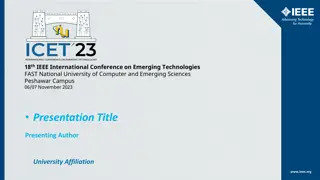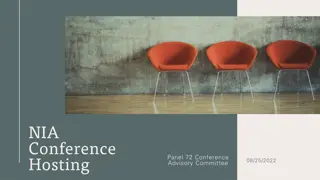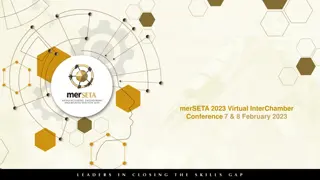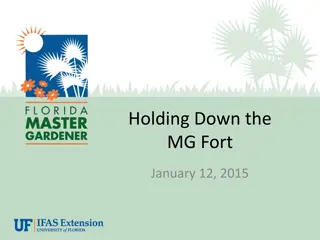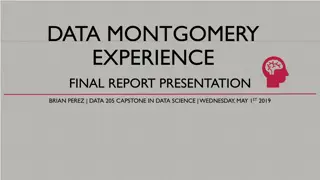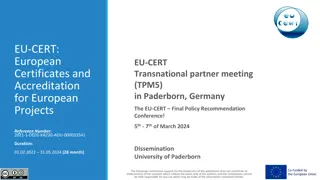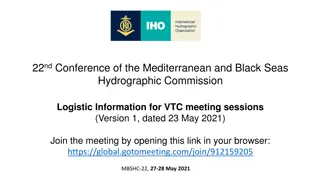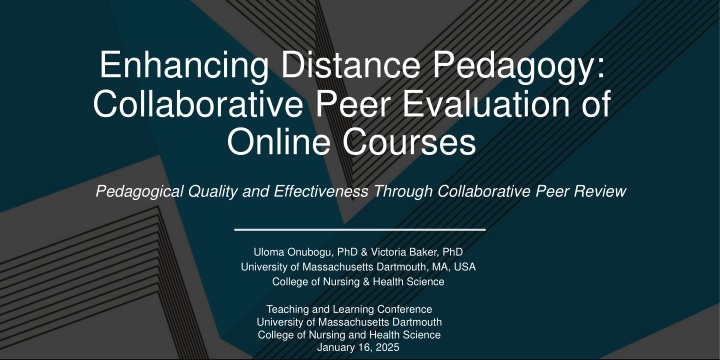
Collaborative Peer Evaluation for Enhancing Distance Pedagogy
Explore collaborative peer evaluation in online courses to improve pedagogical quality and effectiveness. Discover best practices, benefits, and the process for peer review in distance education.
Download Presentation

Please find below an Image/Link to download the presentation.
The content on the website is provided AS IS for your information and personal use only. It may not be sold, licensed, or shared on other websites without obtaining consent from the author. If you encounter any issues during the download, it is possible that the publisher has removed the file from their server.
You are allowed to download the files provided on this website for personal or commercial use, subject to the condition that they are used lawfully. All files are the property of their respective owners.
The content on the website is provided AS IS for your information and personal use only. It may not be sold, licensed, or shared on other websites without obtaining consent from the author.
E N D
Presentation Transcript
Enhancing Distance Pedagogy: Collaborative Peer Evaluation of Online Courses Pedagogical Quality and Effectiveness Through Collaborative Peer Review Uloma Onubogu, PhD & Victoria Baker, PhD University of Massachusetts Dartmouth, MA, USA College of Nursing & Health Science Teaching and Learning Conference University of Massachusetts Dartmouth College of Nursing and Health Science January 16, 2025
Objectives current state of faculty peer review for distance/online courses Identify framework, content, and tool in online course peer evaluation process Link collaborative peer evaluation best practices and benefits Describe peer evaluation findings to institutional experience. Apply
Distance Pedagogy & Best Practices in Peer Review Introduction Literature Review Overview of distance pedagogies Limited focus on online peer review Online courses review is different from traditional face to face Peer instructional review is less common, and challenging Collaborative review is recommended (Cutroni & Paladino, 2023; Kim et al, 2024; Zimmerman et al, 2018, 2020; Wright et al, 2023) Sound pedagogies Pedagogical effectiveness through quality assurance Purpose and goal of review process Formative Summative Institutional Best Practices (Donnelly-Sallee & Autry, 2018) Clear objectives; training for evaluators; constructive feedback; confidentiality Good teaching online Supportive environment & faculty buy-in (Bell & Thomson, 2018; Tobin et al, 2015; Zimmerman et al, 2018) Benefits of peer evaluation Learner Educator Institution
Collaborative Online Course Peer Review Activity Preparation: Review Process & Tools Why Collaborative Approach Case Report from UMassD Five-Step Process Office of Faculty Development classroom visit Approach & Scope of Review Select peers & criteria Identify framework, criteria, and tool Conduct evaluation Analysis & report Feedback & debriefing Peer Observation & Review Asynchronous (Matchett & Main, 2010) Improve course quality and teaching practices Comprehensive evaluation, feedback, and peer validation Collegial support and sense of community Shared responsibility and continuous improvement (Cutroni & Paladino, 2023; Nicolson & Harper, 2014) More credible than student feedback Informal collaborative peer course review Access to online courses as faculty or reviewer Faculty and student views on LMS Report from three nursing faculty in three courses Feedback & Follow-up Discussion Asynchronous & Synchronous (Matchett & Main, 2010) Post-evaluation feedback (Andrews et al., 2021; Barna & Reenan, 2020)
Key Outcomes Lessons Learned & Recommendations Lessons Learned Report from three courses Clear criteria, effective tools, and a supportive culture A whole course review vs a class period Non-threatening experience Valuable and rewarding process Confirms pedagogical effectiveness Gaps Revealed Recommendations Consistent alignment of course outcomes Sub-optimal use of support resources Report to Office of Faculty Development Create more awareness Pathway to online excellence Formative review, peer mentoring, and coaching
Future Trends Discussion & Questions More awareness for instructional and teaching practice review Online Pilot Incorporate new technologies including AI-assisted review Quality Assurance Needs Expand the scope of review to include students What do you think? Ongoing research
Thank you Uloma Onubogu, PhD, EdD, FNP, CNE Assistant Dean, Online Learning uonubogu@umassd.edu Victoria L. Baker, PhD, CPH, CNM Adjunct Faculty vbaker@umassd.edu University of Massachusetts Dartmouth College of Nursing and Health Sciences
References Andrew, L., Wallace, R., & Sambell, R. (2021). A peer-observation initiative to enhance student engagement in the synchronous virtual classroom: A case study of a COVID-19 mandated move to online learning. Journal of University Teaching & Learning Practice, 18(4), 14. Barna, A., & Reenan, S. (2020). Graduate Instructor Peer Observation in Music Theory Pedagogy. Journal of Music Theory Pedagogy, 34(1), 1. Bell, A., & Thomson, K.E. (2018). Supporting peer observation of teaching: Collegiality, conversations, and autonomy. Innovations in Education and Teaching International, 55, 276 - 284. Christie, B., & Skylar, A. (2017, September 26). QM statewide systems talk data: Inputs, outputs, and outcomes [Conference presentation]. QM Connect Conference, Fort Worth, TX, United States. K Cutroni, L., & Paladino, A. (2023). Peer-ing in: A systematic review and framework of peer review of teaching in higher education. Teaching and Teacher Education, 133, 104302. https://doi.org/10.1016/j.tate.2023.104302 Donnelli-Sallee, E., Autry, D. (2018). Supporting online teaching effectiveness at scale: Achieving efficiency and effectiveness through peer review. Journal of Educators Online. Harper, F., & Nicolson, M. (2013). Online peer observation: its value in teacher professional development, support and well-being. The International Journal for Academic Development, 18(3), 264 275. https://doi.org/10.1080/ 1360144X.2012.682159. Kim, S., Wright, K., Westine, C. D., Lambert, M. C., & Sun, T. (2024). Examining Peer Observation Practices of Online Teaching and Learning Through Analysis of Existing Instruments. American Journal of Distance Education, 1 25. https://doi.org/10.1080/08923647.2024.2330269 Matchett, N. J., Main, C. (2010). Faculty Collaboration at a Distance. Using Online Peer Reviews to Improve Course Design. Educause Quarterly, 33(3), Online. www.educause.edu/EDUCAUSE+Quarterly/EDUCAUSEQuarterlyMagazineVolum/FacultyCollaborationataDistanc/213782
References Nicolson, M., & Harper, F. (2014). Online peer observation: an exploration of a cross-discipline observation project. International Journal of Teaching and Learning in Higher Education, 26(2), 251 259 https://www.isetl.org/ijtlhe/ijtlhe-article-view.php? mid=1842. Online Learning Consortium. (2016). Online learning consortium quality scorecard Suite. K. Shelton, G. Saltsman, L. Holstrom, & K. Pedersen (Eds). Retrieved from https://onlinelearningconsortium.org/consult/olc-quality-scorecard-administration-online- programs/ Quality Matters (2024). Why QM? Downloaded 6/19/24 from https://www.qualitymatters.org/sites/default/files/PDFs/Why-Use- Quality-Matters-2024.pdf. K Singh, V. & Thurman, A. (2023). A Systematic Literature Review of Online Learning Spanning 26 Years (1993 2018) Journal of Education for Library and Information Science (64)3: 233-56. DOI: 10.3138/jelis-2020-0107 Shattuck, K., Zimmerman, W., & Adair, D. (2014). Continuous improvement of the QM Rubric and review processes: Scholarship of integration and application. Internet Learning, 3(1), 25 34. http://joom.ag/w08b/p24 Tobin, T. J., Mandernach, B. J., & Taylor, A. H. (2015). Evaluating online teaching: Implementing best practices. San Francisco, CA: Jossey-Bass. As cited in Donnallee-Sallee & Autry, 2018 Wright, A. C., Carley, C., Alarakyia-Jivani, R., Nizamuddin, S. (2023). Features of high quality online courses in higher education: A scoping review. Online Learning, 27(1), 46-70. DOI: 10.24059/olj.v27i1.3411 Zimmerman, W., Altman, B., Simunich, B., Shattuck, K., & Burch, B. (2020). Evaluating online course quality: A study on implementation of course quality standards. Online Learning,24(4), 147-163.




